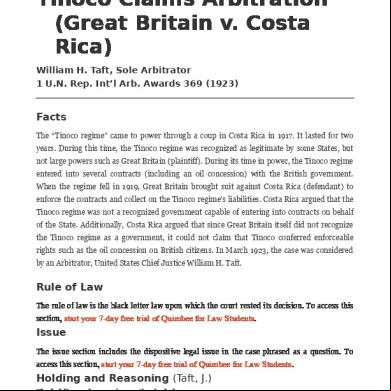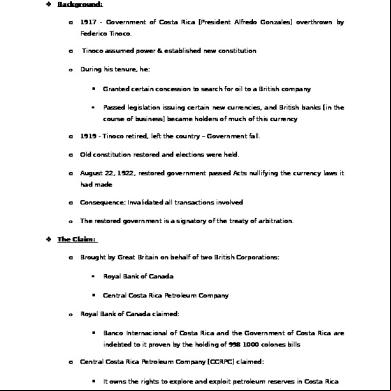Tinoco Case g6f6f
This document was ed by and they confirmed that they have the permission to share it. If you are author or own the copyright of this book, please report to us by using this report form. Report 3b7i
Overview 3e4r5l
& View Tinoco Case as PDF for free.
More details w3441
- Words: 615
- Pages: 2
Tinoco Claims Arbitration (Great Britain v. Costa Rica) William H. Taft, Sole Arbitrator 1 U.N. Rep. Int’l Arb. Awards 369 (1923)
Facts The “Tinoco regime” came to power through a coup in Costa Rica in 1917. It lasted for two years. During this time, the Tinoco regime was recognized as legitimate by some States, but not large powers such as Great Britain (plaintiff). During its time in power, the Tinoco regime entered into several contracts (including an oil concession) with the British government. When the regime fell in 1919, Great Britain brought suit against Costa Rica (defendant) to enforce the contracts and collect on the Tinoco regime’s liabilities. Costa Rica argued that the Tinoco regime was not a recognized government capable of entering into contracts on behalf of the State. Additionally, Costa Rica argued that since Great Britain itself did not recognize the Tinoco regime as a government, it could not claim that Tinoco conferred enforceable rights such as the oil concession on British citizens. In March 1923, the case was considered by an Arbitrator, United States Chief Justice William H. Taft.
Rule of Law The rule of law is the black letter law upon which the court rested its decision. To access this section, start your 7-day free trial of Quimbee for Law Students .
Issue The issue section includes the dispositive legal issue in the case phrased as a question. To access this section, start your 7-day free trial of Quimbee for Law Students .
Holding and Reasoning (Taft, J.) The holding and reasoning section includes:
A “yes” or “no” answer to the question framed in the issue section; A summary of the majority or plurality opinion, using the CREAC method; and The procedural disposition (e.g. reversed and remanded, affirmed, etc.). Tinoco Claims Arbitration (Great Britain v. Costa Rica) (1923) 1 R.I.A.A. 369 Procedural History: Arbitration of contract repudiation. Overview: Great Britain (P) claimed that the former government of Costa Rica (D), the Tinoco regime, had granted oil concessions to a British company that had to be honored by the present regime. The Tinoco regime had seized power in Costa Rica by coup. Great Britain (P) and the United States never recognized the Tinoco regime. When the Tinoco regime fell, the restored government nullified all Tinoco contracts, including an oil concession to a British company. Great Britain (P) claimed that the Tinoco government was the only government in existence at the time the contract was signed and its acts could not be repudiated. Costa Rica (D) claimed that Great Britain (P) was estopped from enforcing the contract by its nonrecognition of the Tinoco regime. The matter was sent for arbitration. Issue: Does nonrecognition of a new government by other governments destroy the de facto status of the government? Rule: -A government that establishes itself and maintains a peaceful de facto istration need not to conform to previous constitution and nonrecognition of the govt. by other govt.’s does not destroy the de facto status of the govt. Analysis: The arbitrator found there was no estoppel. The evidence of nonrecognition did not outweigh the evidence of the de facto status of the Tinoco regime. Unrecognized governments thus may have the power to form valid contracts. Outcome: No. A government that establishes itself and maintains a peaceful de facto istration need not conform to a previous constitution and nonrecognition of the govern ment by other governments does not destroy the de facto status of the government. Great Britain's (P) nonrecognition of the Tinoco regime did not dispute the de facto existence of that regime. There was no estoppel since the successor government had not been led by British nonrecognition to change its position.
Facts The “Tinoco regime” came to power through a coup in Costa Rica in 1917. It lasted for two years. During this time, the Tinoco regime was recognized as legitimate by some States, but not large powers such as Great Britain (plaintiff). During its time in power, the Tinoco regime entered into several contracts (including an oil concession) with the British government. When the regime fell in 1919, Great Britain brought suit against Costa Rica (defendant) to enforce the contracts and collect on the Tinoco regime’s liabilities. Costa Rica argued that the Tinoco regime was not a recognized government capable of entering into contracts on behalf of the State. Additionally, Costa Rica argued that since Great Britain itself did not recognize the Tinoco regime as a government, it could not claim that Tinoco conferred enforceable rights such as the oil concession on British citizens. In March 1923, the case was considered by an Arbitrator, United States Chief Justice William H. Taft.
Rule of Law The rule of law is the black letter law upon which the court rested its decision. To access this section, start your 7-day free trial of Quimbee for Law Students .
Issue The issue section includes the dispositive legal issue in the case phrased as a question. To access this section, start your 7-day free trial of Quimbee for Law Students .
Holding and Reasoning (Taft, J.) The holding and reasoning section includes:
A “yes” or “no” answer to the question framed in the issue section; A summary of the majority or plurality opinion, using the CREAC method; and The procedural disposition (e.g. reversed and remanded, affirmed, etc.). Tinoco Claims Arbitration (Great Britain v. Costa Rica) (1923) 1 R.I.A.A. 369 Procedural History: Arbitration of contract repudiation. Overview: Great Britain (P) claimed that the former government of Costa Rica (D), the Tinoco regime, had granted oil concessions to a British company that had to be honored by the present regime. The Tinoco regime had seized power in Costa Rica by coup. Great Britain (P) and the United States never recognized the Tinoco regime. When the Tinoco regime fell, the restored government nullified all Tinoco contracts, including an oil concession to a British company. Great Britain (P) claimed that the Tinoco government was the only government in existence at the time the contract was signed and its acts could not be repudiated. Costa Rica (D) claimed that Great Britain (P) was estopped from enforcing the contract by its nonrecognition of the Tinoco regime. The matter was sent for arbitration. Issue: Does nonrecognition of a new government by other governments destroy the de facto status of the government? Rule: -A government that establishes itself and maintains a peaceful de facto istration need not to conform to previous constitution and nonrecognition of the govt. by other govt.’s does not destroy the de facto status of the govt. Analysis: The arbitrator found there was no estoppel. The evidence of nonrecognition did not outweigh the evidence of the de facto status of the Tinoco regime. Unrecognized governments thus may have the power to form valid contracts. Outcome: No. A government that establishes itself and maintains a peaceful de facto istration need not conform to a previous constitution and nonrecognition of the govern ment by other governments does not destroy the de facto status of the government. Great Britain's (P) nonrecognition of the Tinoco regime did not dispute the de facto existence of that regime. There was no estoppel since the successor government had not been led by British nonrecognition to change its position.










